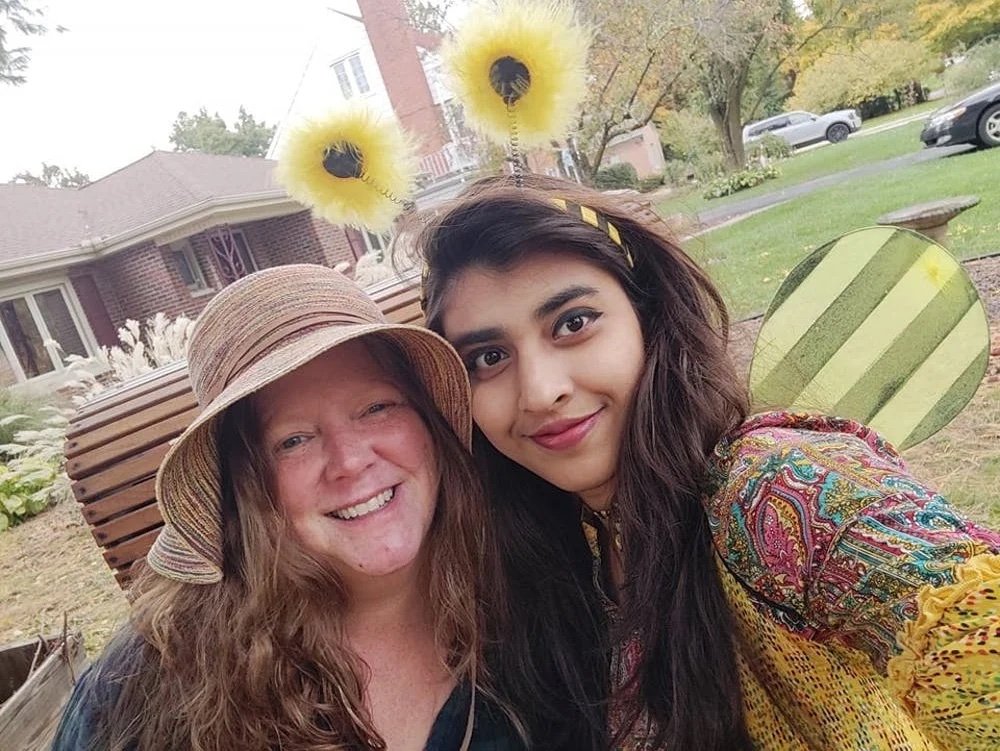Ball State’s Friendship Family Program participants share international bonding experiences
Lilunnaher Chandni poses with her Friendship Family host Amy Beckett, Ball State assistant teaching professor of criminal justice and criminology. The pair dressed as a farmer and bee for Halloween. Amy Beckett, Photo Provided
Published January 13, 2022 on The Ball State Daily News website
When Ashra Wickramathilaka, second-year graduate urban and regional planning major from Galle, Sri Lanka, came to Muncie, she didn’t know any family members or friends who lived in the area. This, coupled with homesickness, made adjusting to American life difficult, she said.
Since 1960, Ball State’s Friendship Family Program has provided international students like Wickramathilaka with familiar faces away from home.
“Programs like this are important because they provide a helpful support system for international students while they are away from their home countries, along with cross-cultural understanding and awareness for both international students and local host families,” Friendship Family Coordinator Samantha Fletcher said.
Fletcher said both students and families specify preferences, such as spoken languages or gender, for their Friendship Family match in their applications, which are open year-round. Students and families are then paired together based on those individual preferences. The host program can last as long as the students are studying at Ball State, or they can request different family matches.
While students don’t live with their assigned families, they spend time with one another, depending on the student’s and family’s schedules. Fletcher said host families also help their students adjust to American culture and life in Muncie, but she said life in another country can still be hard for students who aren’t used to being so far from home.
“Many international students experience some degree of culture shock and homesickness, and Friendship Families are equipped with a variety of tools for supporting students experiencing these difficulties,” Fletcher said. “However, families are not expected to offer emotional support beyond their capacity to their friendship students — this is what the university Counseling Center is for.”
How students and their host families spend time together depends on the family and the student’s preferences. Popular examples include community events, having dinner and participating in each other’s holiday traditions. These pairings allow students and host families to learn more about each other’s cultures.
Amy Beckett, assistant teaching professor of criminal justice and criminology, said the students she was paired with would help her in her garden because they often had come from countries that didn’t have much yard space to play around or work in.
“They love to play in the backyard,” Beckett said. “There's a couple of kids associated with our family who've been over, like bobbing for apples and playing croquet and stuff with them.”
Cheryl Simpkins, Ball State custodial group leader, has participated in the program for 16 years, and she and her paired students take turns making each other food. She makes the first dish and then her students make a dish from their country.
“One of the most interesting dishes was from [two girls] from China and Sri Lanka,” Simpkins said. “They were roommates, and I went there and they made me dinner. And, we didn't use forks. We used our hands … and I loved it. It's like not being divorced from your food or where it comes from.”
Wickramathilaka has also experienced new activities and traditions during her time in Muncie.
“I'm a Buddhist, and I never experienced this Christmas thing, so I've never decorated a Christmas tree in my life,” Wickramathilaka said. “So, recently, she bought me my very first Christmas tree, and most of my first life experiences were from them. I've never received a birthday gift [in] my life before I came here, so they bought me [my] first birthday gift ever. I'm really glad that I met them.”
Wickramathilaka’s birthday gifts were a cookbook, a set of makeup, four Ball jars from 1901 and a blanket. She said she received the cookbook because she wanted to make American food, and she received the blanket because her family knew how much she struggled to stay warm in the winter.
Fletcher said the program typically receives many student applications at the beginning of the year but only a handful of new families each year. Most of the families who apply are returning applicants. Due to more students applying than families, some students are unable to be paired right away.
“We are always looking to recruit new families to participate in the program,” Fletcher said. “Right now, we have a long list of international students waiting to be matched with a Friendship Family. Anyone interested in applying for the program can fill out an application on our website.”
